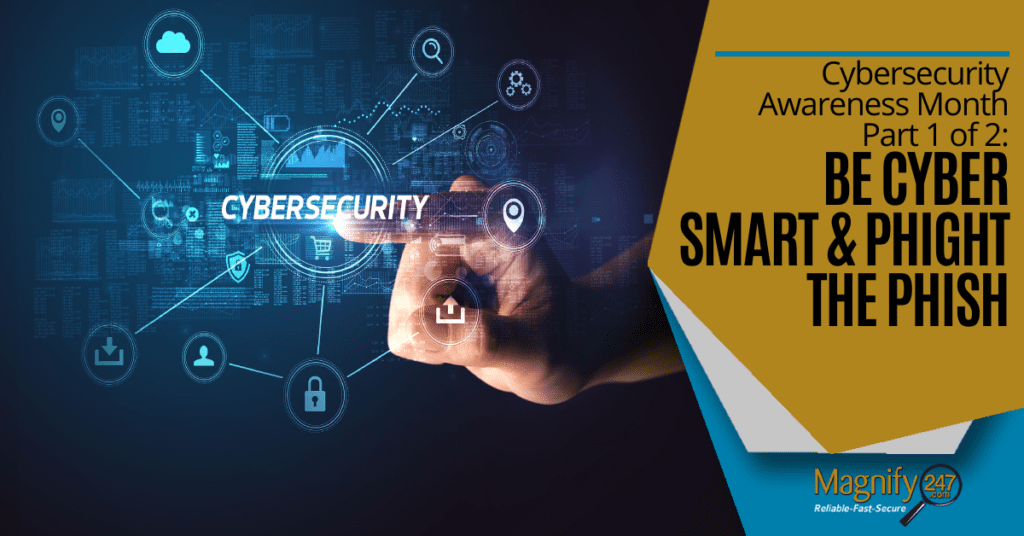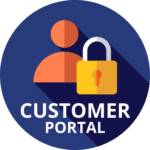
Every October we recognize Cybersecurity Awareness Month (CAM), which is an effort by the Cybersecurity & Infrastructure Agency (CISA) and the National Cybersecurity Alliance (NCSA) to increase awareness about the importance of cybersecurity at home and work.
watch short video > https://www.youtube.com/c/Magnify247
There is an IT security theme each week, and in part 1 of our 2-part series, we are going to review the themes for the first two weeks, which are:
- Be Cyber Smart !
- Phight the Phish !
The need for a focus on cybersecurity only continues to increase as online attacks multiply each year. In 2020, attacks on cloud accounts skyrocketed 630% and ransomware attacks increased 485%.
Now is the perfect time to prepare your business or home office for better online security in 2022, following these recommendations from CISA & NCSA.
CAM Week 1: Be Cyber Smart
Being cyber smart is about recognizing that security awareness and best practices begin with YOU. You can’t just rely on the company’s antivirus to do the heavy lifting or your cloud application provider to ensure you’re not being irresponsible with your password.
There are several things you can do to take personal responsibility for your online security and that of your company.
Protect Your Mobile Devices
Mobile devices are often much less protected than computers. For example, many smartphones don’t have an antivirus/anti-malware installed, yet the owners often read emails from their phones and can click on the same dangerous phishing links to unleash ransomware and other malicious malware.
It’s important to protect your mobile devices with the same strong protections you use for your PC.
Use MFA to Protect Your Accounts
One of the best ways to keep your cloud accounts from being breached is by using multi-factor authentication (MFA). This blocks approximately 99.9% of fraudulent cloud account sign-ins.
Back-Up Your Data Regularly
Data can be lost in many ways, including due to a ransomware attack. Many companies don’t have a restorable backup copy of their data and have to pay the ransom to the attackers, which further emboldens them to do more attacks.
Keep data backed up regularly and test your backup restoration at least quarterly.
Create Strong Passwords
Weak passwords make it easy for the bad guys to gain access to your online banking, Microsoft 365 account, Amazon account, and more. Follow these standard guidelines for creating strong passwords:
- Use at least 10 characters
- Use a mix of upper and lower-case letters
- Use at least one letter, symbol, and number
- Use a strong password generator
Use a Password Manager
The easiest way to improve password security and avoid reusing the same password multiple times is to use a password manager.
The app will suggest strong passwords and keep all your passwords stored securely in a single vault, and you only need to remember one password to access the others.
Update Software Regularly
Regular software updates are vital to keeping your system secure from attacks. Many attackers exploit found software vulnerabilities and as long as users don’t apply the provider’s patch to fix the issue, their system is still at risk.
CAM Week 2: Phight the Phish!
Phishing continues to be the main mode of entry for all types of online attacks, from credential theft to spyware infections. It’s vital to be aware of phishing and make phishing safety a main priority when you’re online.
Use the SLAM Method to Verify Email Legitimacy
A good way to approach your email inbox is to check email legitimacy using the SLAM method. The method goes like this:
- Sender: Review who sent the message closely and look for any misspellings in the domain name or any unrecognized senders.
- Links: Hover over links without clicking them to see if they are really going where they claim.
- Attachments: Don’t open attachments from unknown or suspicious senders.
- Message: Check the message thoroughly for any grammar or spelling errors and the use of pressure tactics to get you to react.
Be Aware, Don’t Overshare
Phishing scammers will often troll social media to get personal details on you or one of your friend connections. These are then used in phishing emails to make them more believable.
Put your social accounts on private and be careful about the sensitive details you share over social media.
Use Antivirus & Anti-Malware Software
It’s important to use antivirus/anti-malware software on all devices that you use for accessing your email, this includes mobile devices or wearables.
Think Before You Click
Don’t blindly click on email links, even if the email seems to be legitimate. Scammers often spoof company emails like UPS or Amazon. Hover over links before you click them.
Monitor Your Dark Web Presence
Your passwords can be breached without you even realizing it if an online retailer you’ve used has a data breach. Use a Dark Web monitoring service to keep an eye out for any sign of your email address, phone number, or other personal information.
Beware of Social Engineering
Social phishing is becoming more common. Watch out for people being too friendly too fast, this could be a trap to con you once they gain your trust. Also be wary of any links you see in social media posts, which can be phishing links to malicious sites.
Improve Your Overall Security with a Managed Services Plan
Magnify247 can help your Hamilton County home or business with a worry-free managed services plan that takes care of multiple IT security protections all at once.
Contact us today to learn more!






